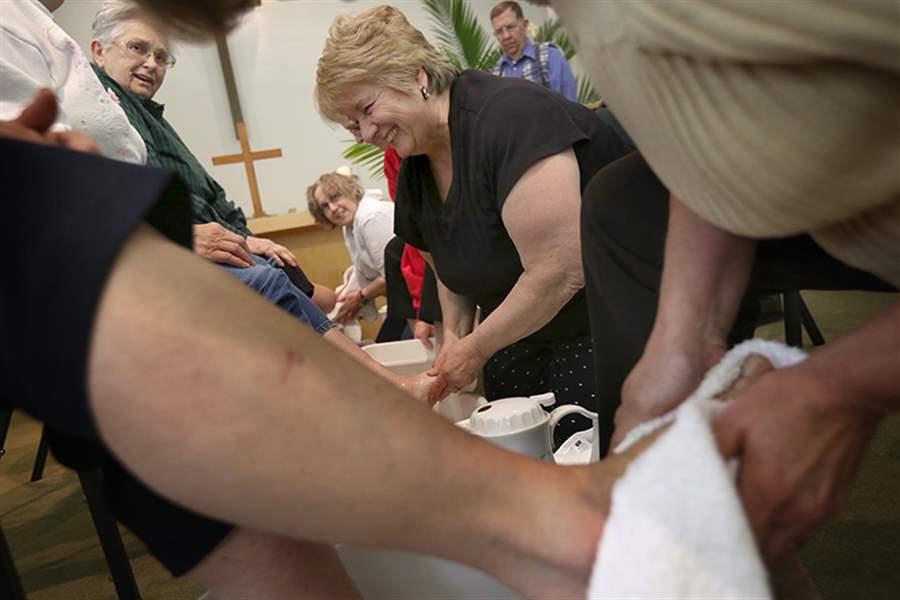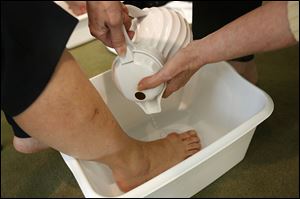
Humble service theme of Maundy Thursday
Pastor calls foot washing ‘worship’
4/17/2014
Karen Walker of Lambertville washes the feet of Ronalda Whitmill during a Maundy Thursday service at Trilby United Methodist Church in West Toledo.
THE BLADE/KATIE RAUSCH
Buy This Image

Karen Walker of Lambertville washes the feet of Ronalda Whitmill during a Maundy Thursday service at Trilby United Methodist Church in West Toledo.
The meaning of Maundy Thursday is sometimes forgotten.
It is the start of the triduum, the three days of Maundy Thursday, Good Friday, and Holy Saturday that lead up to Easter Sunday, when Christians celebrate the resurrection of Jesus.
At Trilby United Methodist Church, about 15 people observed Maundy Thursday at a foot washing service.
“You can’t do this wrong, folks, it’s worship,” the Rev. Larry Swaisgood, Trilby’s pastor, said. “Have some fun, lighten up, and I’m telling you, when you feel someone washing your feet, it’s going to feel good all over.”
While the Biblical books of Matthew, Mark, and Luke say that Jesus’ last supper with his disciples, before his arrest and crucifixion, was the Passover Seder meal — when Jews celebrate liberation from slavery in Egypt — the book of John’s language is: “Now before the feast of the Passover” and “And supper being ended.” That last supper, whether on Passover or the night before, “from this night on became holy communion,” Pastor Swaisgood said.
“You don’t see in John’s gospel anything of the meal,” said University of Toledo professor Peter Feldmeier, who holds the Murray/Bacik Endowed Chair in Catholic Studies. “It’s not interesting to John’s gospel. It’s the footwashing that’s a huge thing.”
Pastor Swaisgood read from Chapter 13 of John at the foot-washing service. In those verses, Jesus washed his disciples’ feet as a servant, and the Scripture does not say that Jesus’ own feet were washed.
Verse 14 quotes Jesus as saying, “If I then, your Lord and Master, have washed your feet; ye also ought to wash one another’s feet.”
Maundy shares a Latin root word with mandate, and that’s why Jesus’ command to serve has led to foot-washing services.
At Trilby, warm water was used, no soap, and a clean white towel dried the feet after.

Kathy Botz of West Toledo pours warm water over the feet of her sister, Joy Jeffries of Frankfort, Ky., before washing them during a Maundy Thursday service at Trilby United Methodist Church. The act recalls how Jesus washed his disciples’ feet.
Kathy Botz of West Toledo said, “I had not been to feet washing services since I was probably 10, 12, and I think it’s very meaningful. I think that people should experience it.”
Her sister, Joy Jeffries of Frankfort, Ky., who is visiting to celebrate their mother’s 90th birthday today, said, “It wasn’t anything too strange for me because my husband was a minister for 42 years.”
Though she has been to many Maundy Thursday services, she and her sister referred to the foot-washing ritual as humbling.
Mr. Feldmeier said that foot washing is “symbolic of who Jesus was as savior,” and it has a “sense of Christ as this God/servant and thus a model of what God looks like, which is really something.”
“The message isn’t foot washing,” Pastor Swaisgood said at Trilby. “It’s about humble service.”
Contact TK Barger @ tkbarger@theblade.com, 419-724-6278 or on Twitter @TK_Barger.